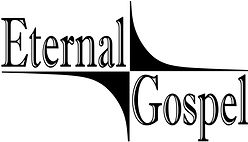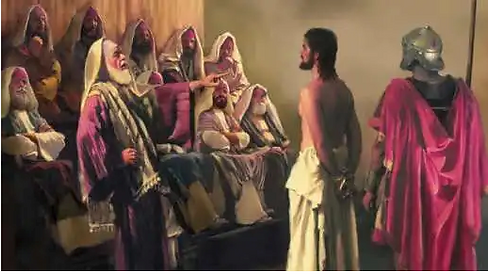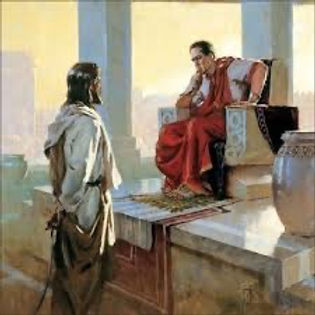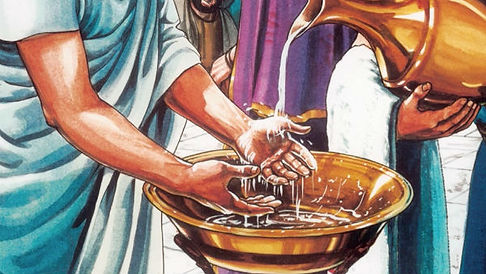

Seek TRUTH - Choose LIFE

THE GOSPEL

Judgement by Sanhedrin
Once Judas betrayed Jesus in the garden of Gethsemane He was taken to Annas who was a father in law of Caiaphas the high priest that year. Annas questioned Jesus about his teaching (John 18:19-23). Having found no evidence to condemn Jesus He was taken bound to Caiaphas (John 18:24).

The Sanhedrin was a supreme council composed of of: elders, chief priests and scribes who had authority in religious and civil matters headed by the high priest. Caiaphas the high priest (Matthew 26:57) was the one who suggested to have Jesus killed saying: "You know nothing at all, nor do you consider that it is expedient for us that one man should die for the people, and not that the whole nation should perish.” (John 11:49-50, 18:14). He did not say this from himself because Jesus would not only die for the whole nation to be saved but so that all nations could be saved through faith in Him (John 3:16).
When no false witness testimony stood evident the high priest himself questioned Jesus: “I put You under oath by the living God: Tell us if You are the Christ, the Son of God!” Jesus said to him, “It is as you said. Nevertheless, I say to you, hereafter you will see the Son of Man sitting at the right hand of the Power, and coming on the clouds of heaven.”(Mark 14:62, Luke 22:70)
Then the high priest tore his clothes, saying, “He has spoken blasphemy! (Matthew 26:65-66)
This statement alone was enough for them to condemn Jesus to death. As they have condemned Him to death they hit Him and mocked Him (Matthew 26:67). The Sanhedrin was not allowed to legally put Jesus to death because they were under Roman Imperial rule (John 18:31). When the morning came they sent Jesus to the governor Pontius Pilate, the governor of Judea province (Luke 3:1).

Judgement by Pilot

By morning, the Sanhedrin had provoked the whole nation against Jesus and the multitudes (Luke 23:1) brought Him before Pilate (Marcus Pontius Pilatus) the governor of Judea. Pilate seeing no fault (Luke 23:4, John 18:38) in Jesus sent Him to Herod (Luke 23:6) because he know Jesus was condemned out of envy (Mark 15:10).
Herod was excited to see Jesus because he had heard of His miracles (Luke 23:8) and from John the baptist whom he executed (Mark 6:16, Luke 9:9). Finding no fault in Jesus he mocked him and sent back to Pilate (Luke 23:11).
Pilate had a custom to release one of the prisoners on Passover feast. There was a known criminal maned Barabbas (meaning son of the father) and he led him before the people. But the crowd stirred up by the scribes demanded the release of Barabbas and have Jesus crucified (Matthew 27:22). Pilate objected to have Jesus killed but rather scourged and released (Luke 23:16, John 19:1).

Scourging of Jesus

Then the soldiers of the governor took Jesus into the Praetorium and gathered the whole garrison around Him. (Matthew 27:27) After the soldiers scourged and mocked Jesus (Matthew 27:27-31, Mark 15:16-20, John 19:2-3), Pilate led Him out before the people wearing a crown of thorns and purple robe (John 19:4). Jesus was beaten beyond human recognition (Isaiah 52:14, 53:7) and people demanded Pilate even more violently to crucify Him (John 19:6).

Pilot demanded an explanation and they said: "We have a law, and according to our law He ought to die, because He made Himself the Son of God" (John 19:7). Pilate became afraid from this and brought Jesus back to see if this was so but Jesus did not answer him (John 19:9). Then Pilate said to Him, “Are You not speaking to me? Do You not know that I have power to crucify You, and power to release You?” Jesus answered, “You could have no power at all against Me unless it had been given you from above. Therefore the one who delivered Me to you has the greater sin.” (John 19:10-11) After these words Pilate sought to release Him but the crowd overwhelmed his will and he released them Barabbas (Matthew 27:26, Mark 15:15, Luke 23:25).

Judgement by the nation
Seeking to be innocent of Jesus's blood Pilate symbolically washed his hands to show that his hands are clean from the blood of Christ who he deemed righteous (Matthew 27:24). To this all of people replied: “His blood be on us and on our children.” (Matthew 27:25) Not considering that this crime may bring upon them the destruction of their nation in 70 A.D. hey did not know what they were saying in their rage. They did not recognize Jesus (Luke 19:44) as their messiah, Christ - the anointed of God to deliver them from eternal death.

According to the Passover ordinance the passover lamb was to be examined for 4 days before it could be sacrificed (Exodus 12:3, 5-6) it had to be blameless. When Pilate announced that he did not find any fault in Jesus - he declared Jesus to be a worthy Passover Lamb of God. As we remember the event what Christ has done by partaking in communion we are proclaim that Jesus is our Passover Lamb (1-Corinthians 5:7) who took upon Himself our sins and nailed them to the cross (Colossians 2:14).
This is very important to note since only 40 years later Jerusalem would be destroyed and many Jews would die and be scattered to all corners of the earth. In another way - Jesus’s blood that was shed on the cross now had the power to cleanse everyone who believed in His sacrifice. This condensation that Jesus suffered was destined for each one of us.